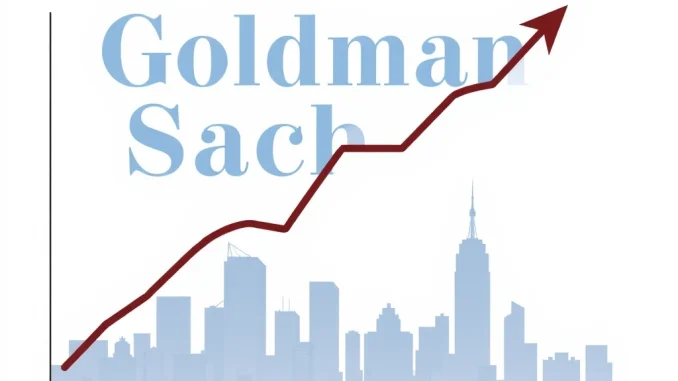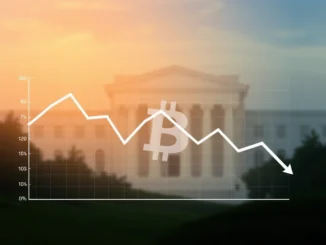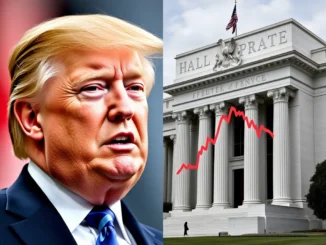
Hold onto your hats, folks! The economic rollercoaster just took another unexpected turn. Just when we were bracing for a potential downturn, Wall Street giant Goldman Sachs has dramatically shifted its stance. Forget the recession alarm bells – they’ve just withdrawn their US recession forecast! This is major news, especially if you’re navigating the volatile waters of the cryptocurrency market. Let’s dive into what this surprising U-turn means for the economy and, potentially, your digital assets.
Why the Sudden Shift in Recession Forecast?
Only days ago, the financial world was digesting Goldman Sachs’ increased probability of a US recession within 12 months, jumping from 35% to a concerning 45% on April 7th. That’s a significant leap, enough to make anyone in the investment world, including crypto enthusiasts, take notice. So, what sparked this rapid change of heart?
According to a tweet by Walter Bloomberg on X, the catalyst is a “tariff pause” by the Trump administration. Here’s the crux of it:
- Tariffs and Economic Uncertainty: Tariffs, essentially taxes on imported goods, can fuel inflation and disrupt supply chains, creating economic uncertainty. This uncertainty was a key factor driving recession fears.
- The Pause Button: A pause in tariff implementation suggests a potential de-escalation of trade tensions. This easing of pressure can be interpreted as a positive signal for economic stability.
- Goldman Sachs Reacts: Seeing this shift, Goldman Sachs, a leading voice in global finance, reassessed their economic models and decided to pull back their recession prediction.
This quick reversal highlights just how sensitive economic forecasts can be to geopolitical and policy shifts. It also underscores the importance of staying nimble and informed in today’s fast-paced financial landscape.
Goldman Sachs and Economic Outlook: What’s the Big Deal?
You might be thinking, “Okay, one firm changed its mind. Why should I care?” Well, Goldman Sachs isn’t just any firm. They are a global investment banking and financial services powerhouse. Their economic pronouncements carry significant weight and influence market sentiment. Here’s why their revised economic outlook matters:
- Market Influence: Goldman Sachs’ views are closely watched by investors worldwide. Their forecasts can sway market behavior, impacting stock prices, bond yields, and even cryptocurrency valuations.
- Credibility and Expertise: They have a vast team of economists and analysts who dedicate themselves to understanding economic trends. Their insights are generally considered highly credible and data-driven.
- Leading Indicator: Changes in Goldman Sachs’ forecasts can sometimes be a leading indicator of broader shifts in the economic narrative. Their withdrawal of the recession call could signal a wider reassessment among financial institutions.
In essence, when Goldman Sachs speaks, the market listens. Their shift away from a recession prediction is a significant vote of confidence in the near-term health of the US economy.
Decoding the Tariff Pause: Is It Really a Game Changer?
The “tariff pause” is the apparent trigger for Goldman Sachs’ revised forecast. But what does this pause actually mean, and is it truly enough to dispel recession fears? Let’s break it down:
- Temporary Relief?: A pause isn’t a cancellation. It suggests a temporary reprieve from escalating trade tensions. The future of tariffs remains uncertain.
- Positive Signal: However, even a temporary pause can be interpreted as a positive sign. It suggests a willingness to negotiate and potentially de-escalate trade conflicts.
- Impact on Businesses: Businesses, which were facing increased costs and uncertainty due to tariffs, might experience some relief and renewed optimism. This can lead to increased investment and hiring.
- Consumer Impact: If tariffs are paused, consumers might avoid further price increases on imported goods, potentially easing inflationary pressures.
While the long-term trade picture remains complex, this tariff pause provides a breather and injects a dose of optimism into the economic outlook. It’s understandable why Goldman Sachs would adjust their recession forecast in response to this development.
Implications for the Crypto Market: Should You Be Bullish?
Now, for the burning question on every crypto enthusiast’s mind: how does this news relate to Bitcoin, Ethereum, and the broader digital asset space? While not a direct correlation, here’s how a receding recession risk can indirectly influence the crypto market:
- Risk Appetite: A reduced recession risk generally boosts investor confidence and risk appetite. When investors are less fearful of economic downturns, they are more likely to allocate capital to riskier assets like cryptocurrencies.
- Macroeconomic Stability: A stable or improving US economy can create a more favorable environment for all asset classes, including crypto. Economic stability reduces uncertainty and can encourage investment.
- Inflationary Pressures (Indirectly): While tariffs can contribute to inflation, a pause might ease those pressures slightly. However, it’s important to remember that inflation and its impact on crypto is a complex issue with multiple factors at play.
- Market Sentiment: Positive news like this can improve overall market sentiment. A more optimistic market mood can spill over into the crypto space, potentially driving up prices.
It’s crucial to remember that the crypto market is influenced by a multitude of factors, including technological developments, regulatory changes, and broader market trends. However, a more positive economic outlook certainly provides a more constructive backdrop for potential crypto growth.
Navigating the Economic Landscape: Key Takeaways
The Goldman Sachs reversal on their recession forecast is a significant development. Here are the key takeaways for you to consider:
- Economic Forecasts are Dynamic: This episode underscores that economic forecasts are not set in stone. They are constantly evolving based on new information and policy changes.
- Stay Informed: Keep an eye on macroeconomic developments, including trade policies, inflation data, and GDP growth. These factors can indirectly influence the crypto market.
- Risk Management is Key: While the news is positive, the economic landscape remains uncertain. Maintain a balanced portfolio and manage your risk appropriately.
- Don’t Overreact: Avoid making impulsive investment decisions based on single news events. Consider the broader context and long-term trends.
The economic narrative is constantly being written and rewritten. The Goldman Sachs shift is a chapter filled with unexpected plot twists. By staying informed, adaptable, and maintaining a long-term perspective, you can navigate these dynamic times and make informed decisions in both the traditional and cryptocurrency markets.
Conclusion: A Sigh of Relief or a Temporary Pause?
Goldman Sachs withdrawing its recession call is undoubtedly welcome news. It injects a dose of optimism into the market and suggests that the immediate threat of a sharp economic downturn may have receded, at least for now. The tariff pause seems to be the catalyst, highlighting the significant impact of trade policy on economic sentiment.
However, it’s crucial to remain cautiously optimistic. A “pause” is not a permanent resolution, and the global economic landscape is still fraught with uncertainties. But for the moment, the shift in economic outlook is a positive signal. It could potentially pave the way for a more favorable environment for risk assets, including cryptocurrencies. Keep your eyes on the economic horizon, stay informed, and be ready to adapt as the story continues to unfold. The world of finance, much like the crypto market, is anything but predictable, and that’s precisely where both the challenge and the opportunity lie.



